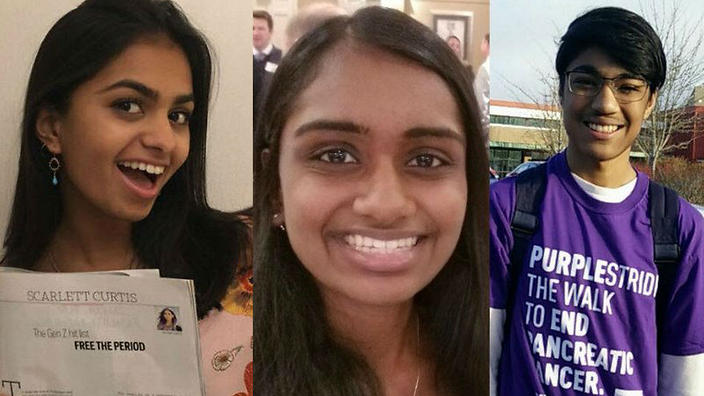It’s a proud moment for every Indian that its new generation is making their name all around the world. Three Indian origin teenagers have been titled by Time magazine as the 25 most influential teens of 2018 for creating a spot through various fields.
Indian-American Kavya Kopparapu, Rishab Jain, and British-Indian Amika George are among the teenaged pioneers
The three teenager’s students are: Kavya Kopparapu and Rishab Jain who are an Indian-American and Amika George who is a British-Indian. These three Indian origin teenagers are among the group who have come to be motivations for youths around the world due to their remarkable accomplishments through their effort and desire.
Indian-American Rishabh Jain, who is eighth grade has established an algorithm that can probably be a solution or can treat pancreatic cancer.
While on the other hand Kavya Kopparapu, an Indian-American teenager is a freshman at the Harvard University. She established a deep learning computer structure that can examine slides of tissue from brain cancer patients regarding for variances in thickness, colour, surface, texture and cellular configuration that are distinctive to that actual person’s example.
She established the structure after learning that from the past 30 years the survival rate of glioblastoma (an aggressive brain cancer) has not improved till date and it need to be improved. Considering this this in mind she created the computer system in order to provide help and bringing advancement in the medical technology.
According to the Time magazine who have asked her about her goal on which she replied that her goal is “to develop targeted therapies that are also unique to the person.”
British-Indian teenager Amika George aim is to persuade officials to end the absence of menstrual products to poor girls and women due to lack of money. In her term she called it “period poverty”. She says that by raising funds, the dispersal of menstrual products to women who don’t have enough money to afford it.
She tells the Time magazine that “It really upsets me” of knowing that a lot of girls in the UK were regularly missing school for the duration of their periods as they could not have enough money to buy menstrual products.
She also added by saying, “The government knew this was happening on their watch, but they were refusing to find a solution.”
She launched a movement called the #FreePeriods movement as a response, collecting nearly 200,000 initials on her appeal to help in eliminating period poverty. The undertaking finally gathered the funding and support of many UK policymakers, stimulating the administration and management to assign funds to the matter for the first time.

Leave a Reply